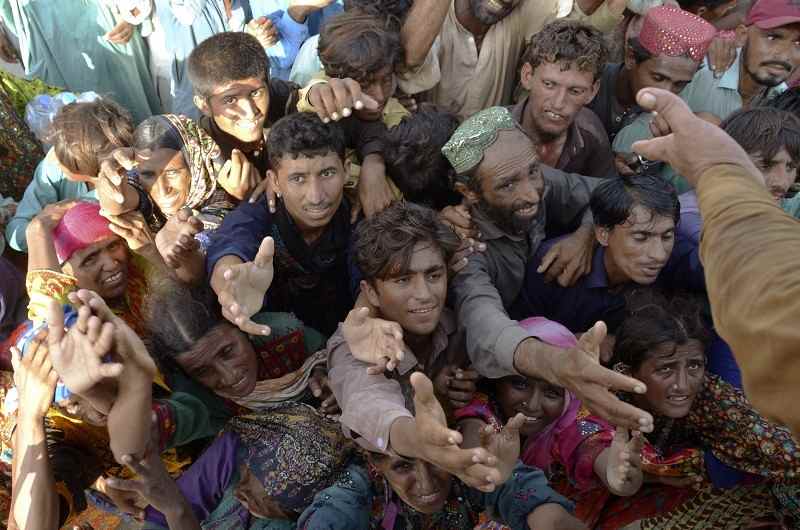
Displaced families, who fled their flood-hit homes, jostle to get relief aid distributed by soldiers of Pakistan rangers, in Dera Allahyar, in Jaffarabad, a district of southwestern Balochistan province, Saturday, Sept. 17, 2022.
10:43 JST, September 18, 2022
ISLAMABAD (AP) — The World Health Organization raised the alarm Saturday about a “second disaster” in the wake of the deadly floods in Pakistan this summer, as doctors and medical workers on the ground race to battle outbreaks of waterborne and other diseases.
The floodwaters started receding this week in the worst-hit provinces but many of the displaced — now living in tents and makeshift camps — increasingly face the threat of gastrointestinal infections, dengue fever and malaria, which are on the rise. The dirty and stagnant waters have become breeding grounds for mosquitos.
The unprecedented monsoon rains since mid-June, which many experts link to climate change, and subsequent flooding have killed 1,545 people across Pakistan, inundated millions of acres of land and affected 33 million people. As many as 552 children have also been killed in the floods.
“I am deeply concerned about the potential for a second disaster in Pakistan: a wave of disease and death following this catastrophe, linked to climate change, that has severely impacted vital health systems leaving millions vulnerable,” WHO’s director-general, Tedros Adhanom Ghebreyesus, said in a statement.
“The water supply is disrupted, forcing people to drink unsafe water,” he said. “But if we act quickly to protect health and deliver essential health services, we can significantly reduce the impact of this impending crisis.”
The WHO chief also said that nearly 2,000 health facilities have been fully or partially damaged in Pakistan and urged donors to continue to respond generously so that more lives can be saved.
Pakistani Prime Minister Shahbaz Sharif left for New York on Saturday to attend the first fully in-person gathering of world leaders at the U.N. General Assembly since the coronavirus pandemic. Sharif will appeal for more help from the international community to tackle the disaster.
Before his departure, Sharif urged philanthropists and aid agencies to donate baby food for children, along with blankets, clothes and other food items for the flood victims, saying they were desperately waiting for aid.
The southern Sindh and southwestern Baluchistan provinces have been the worst hit — hundreds of thousands in Sindh live now in makeshift homes and authorities say it will take months to completely drain the water in the province.
Nationwide, floods have damaged 1.8 million homes, washed away roads and destroyed nearly 400 bridges, according to the National Disaster Management Authority.
Imran Baluch, head of a government-run district hospital in Jafferabad, in the district of Dera Allah Yar in Baluchistan, said that out of 300 people tested daily, nearly 70% are positive for malaria.
After malaria, typhoid fever and skin infections are most commonly seen among the displaced, living for weeks in unhygienic conditions, Baluch told The Associated Press.
Pediatrician Sultan Mustafa said he treated some 600 patients at a field clinic established by the Dua Foundation charity in the Jhuddo area in Sindh, mostly women and children with gastrointestinal infections, scabies, malaria or dengue.
Khalid Mushtaq, heading a team of doctors from the Alkhidmat Foundation and the Pakistan Islamic Medical Association, said they are treating more than 2,000 patients a day and were also providing kits containing a month’s supply of water-purification tablets, soaps and other items.
On Friday, the representative of the U.N. children’s agency in Pakistan, Abdullah Fadil, said after visiting Sindh’s flood-hit areas that an estimated 16 million children had been impacted by the floods. He said UNICEF was doing everything it can “to support children and families affected and protect them from the ongoing dangers of water-borne diseases.”
Top Articles in News Services
-

Survey Shows False Election Info Perceived as True
-

Prudential Life Expected to Face Inspection over Fraud
-

Hong Kong Ex-Publisher Jimmy Lai’s Sentence Raises International Outcry as China Defends It
-

Japan’s Nikkei Stock Average Touches 58,000 as Yen, Jgbs Rally on Election Fallout (UPDATE 1)
-

Japan’s Nikkei Stock Average Falls as US-Iran Tensions Unsettle Investors (UPDATE 1)
JN ACCESS RANKING
-

Japan PM Takaichi’s Cabinet Resigns en Masse
-

Japan Institute to Use Domestic Commercial Optical Lattice Clock to Set Japan Standard Time
-

Israeli Ambassador to Japan Speaks about Japan’s Role in the Reconstruction of Gaza
-

Man Infected with Measles Reportedly Dined at Restaurant in Tokyo Station
-

Videos Plagiarized, Reposted with False Subtitles Claiming ‘Ryukyu Belongs to China’; Anti-China False Information Also Posted in Japan

























